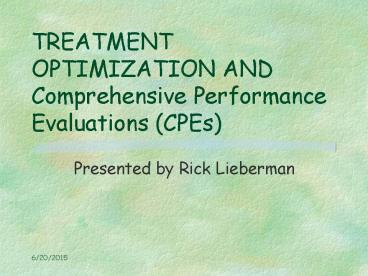TREATMENT OPTIMIZATION AND Comprehensive Performance Evaluations (CPEs) - PowerPoint PPT Presentation
Title:
TREATMENT OPTIMIZATION AND Comprehensive Performance Evaluations (CPEs)
Description:
Title: No Slide Title Author: TSD-CIN Last modified by: bfern Created Date: 3/9/1999 7:26:34 PM Document presentation format: Overhead Company: U.S. EPA – PowerPoint PPT presentation
Number of Views:47
Avg rating:3.0/5.0
Title: TREATMENT OPTIMIZATION AND Comprehensive Performance Evaluations (CPEs)
1
TREATMENT OPTIMIZATION AND Comprehensive
Performance Evaluations (CPEs)
- Presented by Rick Lieberman
2
ACKNOWLEDGMENTS
- Presentation Material was Furnished by Several
Members of the Center for Drinking Water
Optimization (CDWO) - What is the CDWO?
- Formed by Cooperative Agreements Between EPA and
Two Universities the U. of Colorado and the U.
of Cincinnati
3
ACKNOWLEDGMENTS
- Who are the Members of the CDWO?
- University of Colorados Department of Civil,
Environmental and Architectural Engineering
(Scott, Joy) - University of Cincinnatis Department of Civil
and Environmental Engineering (Jim) - Process Applications, Inc. Located in Ft.
Collins, CO (Bob, Larry) - EPAs Technical Support Center located in
Cincinnati, OH (Jon, Eric, Gwen, Rick)
4
Optimized Water Treatment
- What is it?
- Why Pursue it?
- How to Accomplish it State-wide?
- Where do CPEs Fit in?
5
M/DBP Regulations
Public Involvement
Exposure to Liability
Optimization
Status Quo
Optimization is a Choice
6
What is Treatment Optimization?
- Proactive Attitude
- Water Quality Focus
- Optimized Performance Targets
- Sedimentation - 1-2 NTU
- Filtration - lt 0.1 NTU
- Post backwash - lt 0.3 NTU for less than 15 minutes
7
What is Treatment Optimization (cont)?
- Use Existing Facilities
- Enhanced Staff Capability
- Maintain Long Term
- Process, Not End-Point
- Each Plant Is Unique
8
Basis for 0.1 NTU Target
- AWWA Statement of Policy. 1968. Quality Goals
for Potable Water, Journal AWWA, 60(12)1317 - Goal of less than 0.1 unit of turbidity
- There is evidence that freedom from disease
organisms is associated with freedom from
turbidity - Improved technology in the modern treatment
processes makes this a completely practical
goal.
9
Basis for 0.1 NTU Target (Cont)
- Research by Patania (1996)
- Meeting filter effluent turbidity goal of 0.1 NTU
most effective for cyst removal - 3.4 - 5.1 log removal of Giardia
- 2.7 - 5.9 log removal of Cryptosporidium
- Increase in turbidity from lt 0.1 NTU to 0.3 NTU
affected cyst removal (up to 1 log)
10
Basis for 0.1 NTU Target (Cont)
- Research and Full-scale Work by Nieminski (1995)
- Removal of cyst-size particles and turbidity
effective indicators of cyst removal - Consistent removal rates when producing water of
low turbidity (0.1 - 0.2 NTU) - 2.2 - 4 log Giardia
- 1.9 - 3 log Cryptosporidium
- Changes in performance resulted in high
variability in cyst concentrations
11
Why Optimize Treatment?
- Increase Public Health Protection
- Reduce Liability
- Enhance Staff Capability
- Facilitate Compliance
12
Public Health Challenge - Giardia and
Cryptosporidium
- Routinely Detected in Surface Waters
- Resistance to Conventional Disinfection
- Effective Removal Essential
- 0.1 NTU Indicator of Effective Removal
13
Milwaukee, WI Disease OutbreakDiarrhea Onset
Max Plant Effluent Turbidity
14
Liability Implications
- Disease Outbreaks Lead to Liability Concerns
- Compliance No Protection From Liability - Product
Liability - Sydney - Liability w/No Outbreak
- Compensation for lost income
- Senior managers fired
- Optimization Insurance Policy
- Demonstrate Operating in Prudent Manner Critical
15
Enhances Staff Capability
- Commitment and Tenacity
- Role in Public Health Protection
- Long Term Capability
- Process Control Skills
- Problem Solving Skills
- Respond to Unusual Conditions
16
M/DBP Regulations
- 2001 - Systems gt 10,000
- IESWTR
- Stage 1 DBPs
- 2003 - Systems lt 10,000
- LT1ESWTR
- Stage 1 DBPs
- 2005 ? - Next Round of Reg Neg
- LT2ESTWR
- Stage 2 DBPs
17
M/DBP Regulations (cont)
- IESWTR
- Tighter combined turbidity - 0.3 NTU
- Individual filter monitoring
- Disinfection benchmarking
- Stage 1 DBPs
- Tighter MCLs THMs - 80 ?g/L
- New contaminant HAA5 - 60 ?g/L
- TOC removal - enhanced coagulation
18
M/DBP Regulation Implications
- Operational Skills Critical
- Coagulation control for multiple objectives
- Turbidity and DBPs
- Concerned with individual filter performance
- Optimization Assures ESWTR Compliance
- Enhanced Capability for DBP Compliance
19
How can a Primacy Agency Work with PWSs to Pursue
Treatment Optimization?
- Implement an Area-Wide Optimization Program (AWOP)
20
Are CPEs Needed at Each Plant?
21
Comprehensive Performance Evaluation (CPE)
- Identifies the Unique Combination of Factors
Limiting Treatment Plant Performance - Substantial Effort Minimum of 2 Evaluators for
2 - 3 Days (Depending on Plant Size) - CTA Follows CPE to Achieve Optimized Performance
22
AWOP Implementation Prioritizes Resources Based
on Risk
- CPE is only one of several options available to
improve plant performance - Awareness Building Activities
- Data collection Activities
- Apply appropriate tools to improve treatment
plant performance
23
Area-Wide Optimization Model
24
AWOP DEVELOPMENT DEMONSTRATION
- Currently Working with
- AL, GA, KY and SC along with EPA Region IV
- AR, LA, OK, NM along with EPA Region VI
- TNRCC
- PA DEP
25
AWOP DEVELOPMENT DEMONSTRATION (cont)
- Currently Focused on Particle Removal for Surface
Water Treatment Plants - Expanding to Include Disinfection By-Product
Control - EPA Region 6 Expanding to Ground Water Systems
26
Summary
- Optimization is a Choice
- Benefits are Compelling
- Pursue Area-Wide Optimization?































